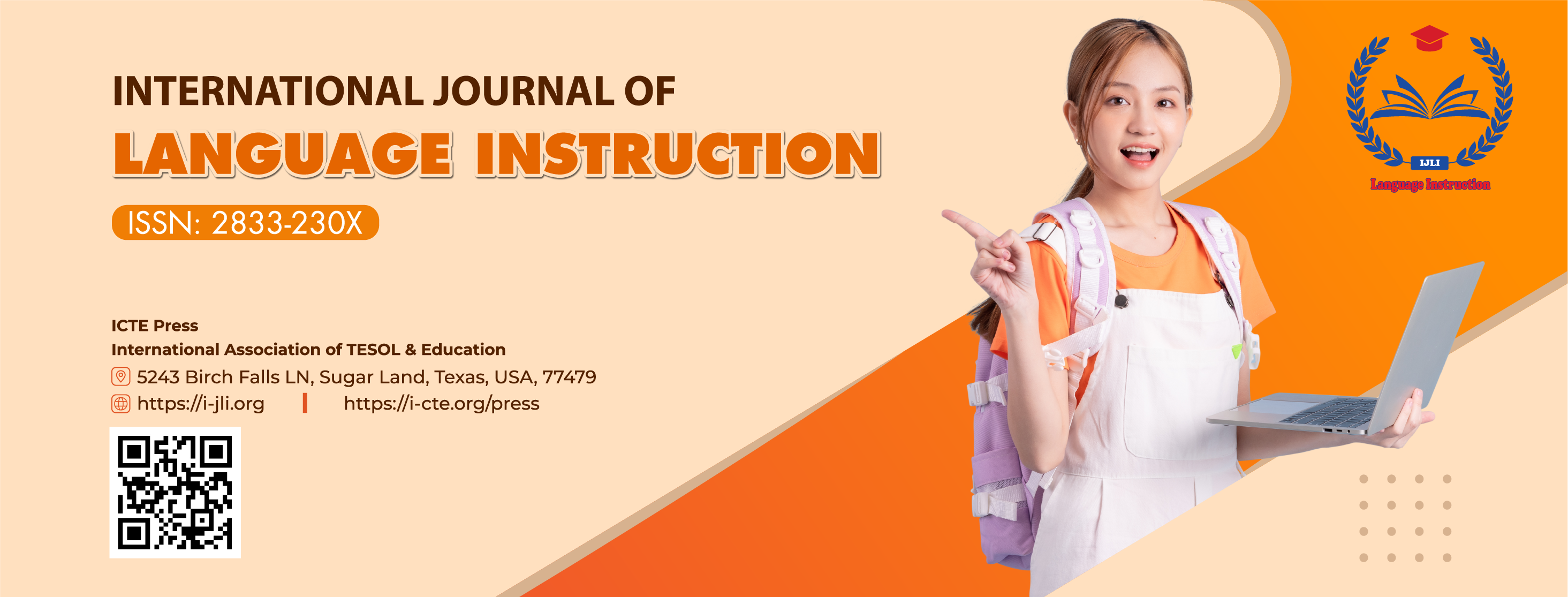Lexical Collocation Errors in Essay Writing: A Study into Vietnamese EFL Students and Their Perceptions
DOI:
https://doi.org/10.54855/ijli.23221Keywords:
lexical collocation errors, EFL learners’ perceptions, essay writing, collocation perceptionsAbstract
Writing requires practicing language by combining words, not using them separately. Accordingly, EFL learners commit errors in lexical usage or lexical collocations. Previous studies have highlighted the significance of collocations in writing and identifying lexical collocation errors, but few researchers have looked into this field in the Vietnamese context. Therefore, this paper investigates lexical collocation errors of Vietnamese EFL learners in their writing essays and their perceptions. 104 English majors at a private university in Vietnam participated in the study. Quantitative and qualitative data were collected, and essays and semi-structured interviews were research tools. The results show that Verb + Noun and Adjective + Noun are the two most common lexical collocation errors, which are attributed to learners’ lack of competence, negative transfer, synonym strategy, and approximation. The interview results suggest EFL learners do not understand collocations adequately, so there should be guidelines and instructions from teachers for better collocation practice.
References
Alqahtani, M. (2015). The importance of vocabulary in language learning and how to be taught. International Journal of Teaching and Education, 3(3), 21-34. https://doi.org/10.52950/TE.2015.3.3.002
Angkana, M. (2008). A Study of University Students’ Ability in Using English Collocations. (Masters’ Thesis). Retrieved from http://thesis.swu.ac.th/swuthesis/Eng(M.A.)/Angkana_M.pdf
Bahns, J. (1993). Lexical collocations: A contrastive view. ELT Journal, 47(1), 56-63.
Barcroft, J. (2004). Second Language Vocabulary Acquisition: A Lexical Input Processing Approach. Foreign Language Annals, 37(2), 200-208. https://doi.org/10.1111/j.1944-9720.2004.tb02193.x
Bartan, Ö. Ş. (2019). Lexical collocation errors in literary translation. Dil Dergisi, 170(1), 71-86.
Bateni, M. R. (2010). Collocations and idioms and their translatability. Iranian Studies, 43(5), 591-597.
Boonraksa, T., & Naisena, S. (2022). A Study on English Collocation Errors of Thai EFL Students. English Language Teaching, 15(1), 164-177. https://doi.org/10.5539/elt.v15n1p164
Bui, T. L. (2021). The role of collocations in the English teaching and learning. International Journal of TESOL & Education, 1(2), 99-109. Retrieved from https://i-jte.org/index.php/journal/article/view/26
Cambridge IELTS (2019). Cambridge IELTS 14 academic: Authentic Practice Tests. Cambridge: Cambridge Press and UCLES.
Cao, D. T. P. (2023). Online Collocation Dictionary in L2 Writing: How Learners Use and Perceive Its Effectiveness. Journal of Language Teaching and Research, 14(1), 108-120. https://doi.org/10.17507/jltr.1401.12
Chan, T. P., & Liou, H. C. (2005). Effects of web-based concordancing instruction on EFL students' learning of verb–noun collocations. Computer Assisted Language Learning, 18(3), 231-251. https://doi.org/10.1080/09588220500185769
Chang, Y. (2018). Features of Lexical Collocations in L2 Writing: A Case of Korean Adult Learners of English. English Teaching, 73(2), 3-36. https://doi.org/10.15858/engtea.73.2.201806.3
Dang, T. B. D., & Nguyen, D. (2022). Difficulties in Understanding and Applying Collocations in Writing of English-Majored Juniors at a University in the Mekong Delta, Vietnam. European Journal of English Language Teaching, 7(3), 151-174. https://doi.org/10.46827/ejel.v7i3.4329
Dang, T. T. C., Thai, D. T. P., Ngo, H. T. L., & Tran , T. T. M. (2022). An Analysis of the Use of Verb-Noun Collocations in Students’ Essays at Hue University of Foreign Languages, Vietnam. Hue University Journal of Science: Social Sciences and Humanities, 131(6A), 7-17. https://doi.org/10.26459/hueunijssh.v131i6A.6405
Duong, D. T. H., & Nguyen, N. D. T. (2021, March). Using Collocations to Enhance Academic Writing: A Survey Study at Van Lang University. In 17th International Conference of the Asia Association of Computer-Assisted Language Learning (AsiaCALL 2021) (pp. 275-287). Atlantis Press.
Erkaya, O. R. (2012). Vocabulary and L1 interference: Error analysis of Turkish students. Literacy Issues in Higher Education, 36(2), 1-11.
Evert, S. (2008). Corpora and collocations. Corpus linguistics. An international handbook, 2, 1212-1248.
Farrokh, P. (2012). Raising awareness of collocation in ESL/EFL classrooms. Journal of Studies in Education, 2(3), 55-74. http://doi.org/10.5296/jse.v2i3.1615
Harta, I. G. W., Bay, I. W., & Ali, S. W. (2021). An analysis of lexical collocation errors in students’ writing. TRANS-KATA: Journal of Language, Literature, Culture and Education, 2(1), 15-25.
Hong, V. T. T., Quyen, T. T. T., Nhu, T. T. T., & Yen, T. T. T. (2022). An Investigation into the Use of Collocations in Academic Essays of English-Majored Students of the High-Quality Program At Can Tho University, Vietnam. European Journal of English Language Teaching, 7(6), 12-30. http://doi.org/10.46827/ejel.v7i6.4540
Hosseini, S. M. B. (2007). Language proficiency and collocational competence. Journal of Asia TEFL, 4(4), 35-58.
Hsu, J. Y. (2007). Lexical Collocations and their Relation to the Online Writing of Taiwanese College English Majors and Non-English Majors. Electronic Journal of Foreign Language Teaching, 4(2), 192-209.
Huang, L. S. (2001). Knowledge of English Collocations: An Analysis of Taiwanese EFL Learners. Texas papers in foreign language education: Selected proceedings from the Texas foreign language education conference 2001, 6(1), 113-129. (ERIC Document Reproduction Service No. 465 288).
Kim, H., & Bae, J. (2012). The Relationship of Collocation Competence with Reading and Writing Skills. English Teaching, 67(3), 95–119. https://doi.org/10.15858/engtea.67.3.201209.9
Kuo, C. L. (2009). An analysis of the use of collocation by intermediate EFL college students in Taiwan. ARECLS, 6, 141-155.
Le Linh, H. (2017). Thanh Hoa High School Teachers’ Perceptions of Collocation and Collocation Teaching (Doctoral dissertation). Retrieved from http://repository.ulis.vnu.edu.vn/bitstream/ULIS_123456789/1471/1/GHP.780.pdf
Llach, M. D. P. A. (2011). Lexical errors and accuracy in foreign language writing. New York: Multilingual Matters. https://doi.org/10.21832/9781847694188
Mahmoud, A. (2005). Collocation errors made by Arab learners of English. Asian EFL Journal, 5(2), 117-126.
McKeown, K. R., & Radev, D. R. (2000). Collocations. Handbook of Natural Language Processing. Marcel Dekker, 1-23.
Nesselhauf, N. (2003). The use of collocations by advanced learners of English and some implications for teaching. Applied linguistics, 24(2), 223-242.
Nguyen, T. K. P. (2021). Perceptions on the Use of Collocations in Academic IELTS Writing Task 2 by Senior English Major Students at Quang Nam University. Tạp Chí Khoa Học – Trường Đại học Quảng Nam, 21, 78-86.
Nguyen, T. M. H., & Webb, S. (2017). Examining second language receptive knowledge of collocation and factors that affect learning. Language Teaching Research, 21(3), 298-320.
Petkoska, V., & Neshkovska, S. (2019). The Importance of Collocations in Acquiring English as a Second Language. Teacher, 15-27. https://doi.org/10.20544/teacher.18.02
Quping, H., & Pramoolsook, I. (2014). Non-English Major EFL Learners’ Lexical Collocation Errors in a Chinese Context. Suranaree Journal of Social Science, 6(1), 1-16. Retrieved from https://so05.tci-thaijo.org/index.php/sjss/article/view/23028
Ridha, N. S. A., & Al-Riyahi, A. A. (2011). Lexical collocational errors in the writings of Iraqi EFL learners. ADAB AL-BASRAH, 58, 24-51. Retrieved from https://www.iasj.net/iasj/download/4406334ec0e3cb86
Sadeghi, K., & Panahifar, F. (2013). A Corpus-Based Analysis of Collocational Errors in the Iranian EFL Learners’ Oral Production. The Journal of Teaching Language Skills (JTLS), 4(4), 53-78. Retrieved from https://tesl.shirazu.ac.ir/article_1137_b59a1347a92c18d0dca2b627c95a10eb.pdf
Sari, E. M. P. (2016). Interlingual errors and intralingual errors found in narrative text written by EFL students in Lampung. Jurnal Penelitian Humaniora, 17(2), 87-95.
Setiarini, N. L. P. (2018, August). Collocation Errors by Indonesian EFL Learners: Types of Errors, Translation Techniques, and Causes of Errors. In Fourth Prasasti International Seminar on Linguistics (Prasasti 2018) (pp. 521-524). Atlantis Press.
Shamsudin, S., Sadoughvanini, S., & Zaid, Y. H. (2013). Iranian EFL Learners’ Collocational Errors in Speaking Skill. Procedia - Social and Behavioral Sciences, 70, 1295–1302. https://doi.org/10.1016/j.sbspro.2013.01.190
Shitu, F. M. (2015). Collocation errors in English as second language (ESL) essay writing. International Journal of Cognitive and Language Sciences, 9(9), 3270-3277. https://doi.org/10.5281/zenodo.1110888
Susanto, A. (2017). The teaching of vocabulary: A perspective. Jurnal Kata: Penelitian Tentang Ilmu Bahasa Dan Sastra, 1(2), 182-191.
Thach, T. D. L. (2022). Teachers’ Perceptions of Comprehensible Input on English Vocabulary Acquisition. International Journal of Language Instruction, 1(1), 120-131. https://doi.org/10.54855/ijli.221110
Trang, N. H., Anh, K. H., & Khanh, T. N. (2021). The Use of English Collocations in Written Translation-A Case of University English-Majored Students. International Journal of Higher Education, 10(1), 252-272. https://doi.org/10.5430/ijhe.v10n1p252
Trng, V. T., & Thao, T. T. (2021). A study on the use of English collocation in writing by students at Thai Nguyen University. International Journal of Social Science and Human Research, 4(5), 1044-1049. https://doi.org/10.47191/ijsshr/v4-i5-19
Vo, T. T. M. (2022). EFL Students’ Attitudes towards Teacher Correction and Peer Correction in Writing Skills. International Journal of Language Instruction, 1(1), 155-173. https://doi.org/10.54855/ijli.221113
Vu, D. V., & Peters, E. (2021). Vocabulary in English language learning, teaching, and testing in Vietnam: A review. Education Sciences, 11, 1-11. https://doi.org/10.3390/educsci11090563
Ying, Y., & O’Neill, M. (2009). Collocation Learning through an ‘AWARE’ Approach: Learner Perspectives and Learning Process. In Barfield, A., Gyllstad, H. (eds) Researching Collocations in Another Language. Palgrave Macmillan, London. https://doi.org/10.1057/9780230245327_14
Yuvayapan, F., & Yükselir, C. (2021). Understanding Turkish EFL Students' Perceptions about Collocations and Investigating Their Collocational Errors in Descriptive and Argumentative Essays. International Journal of Curriculum and Instruction, 13(3), 2178-2194.
Downloads
Published
Issue
Section
License
Copyright (c) 2023 Do Ngoc Hoang My, Le Quang Thao

This work is licensed under a Creative Commons Attribution 4.0 International License.
The copyright of all articles published in the International Journal of Language Instruction (ijli) remains with the Authors, i.e. Authors retain full ownership of their article. Permitted third-party reuse of the open access articles is defined by the applicable Creative Commons (CC) end-user license which is accepted by the Authors upon submission of their paper. All articles in the ijli are published under the CC BY-NC 4.0 license, meaning that end users can freely share an article (i.e. copy and redistribute the material in any medium or format) and adapt it (i.e. remix, transform and build upon the material) on the condition that proper attribution is given (i.e. appropriate credit, a link to the applicable license and an indication if any changes were made; all in such a way that does not suggest that the licensor endorses the user or the use) and the material is only used for non-commercial purposes.
Authors are able to enter into separate, additional contractual arrangements for the non-exclusive distribution of the journal's published version of the work (e.g., post it to an institutional repository, in a journal or publish it in a book), with an acknowledgment of its initial publication in this journal.











